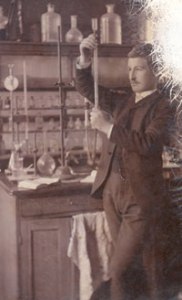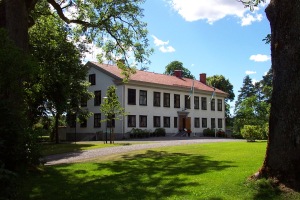Source: The 7R Future Leadership Institute (www.fli.institute)
On 2 January 1897, the will of Alfred Nobel, the deceased Swedish dynamite millionaire was widely published. The bulk of his great fortune was left to form a fund, from the annual income of which five prizes were to be distributed to those who, “during the preceding year, shall have conferred the greatest benefit upon mankind.” In equal amounts prize winners in physics. chemistry, medicine, literature and peace were to be named — “whether Scandinavian or not.”
On 2 January 1897, the will of Alfred Nobel, the deceased Swedish dynamite millionaire was widely published. The bulk of his great fortune was left to form a fund, from the annual income of which five prizes were to be distributed to those who, “during the preceding year, shall have conferred the greatest benefit upon mankind.” In equal amounts prize winners in physics. chemistry, medicine, literature and peace were to be named — “whether Scandinavian or not.”
No man of great wealth had done anything like this before, and the news came as a great surprise to the public, and no less to the disappointed Nobel family. To Nobel’s young assistant, Ragnar Sohlman, the will brought shock. Only after Nobel’s death did he and the Swedish engineer Rudolf Lilljequist learn that they were to be the executors.
Sohlman, a chemical engineer, who was then only twenty-seven years old, had worked in the United States at the Du Pont dynamite factory and was on the staff of the Swedish pavilion at the Chicago World’s Fair of 1893 when a telegram arrived from Alfred Nobel, whom he had never met, offering him the position as his personal assistant. In the next three years he more than lived up to his high recommendations, not only serving as Nobel’s valued assistant and coworker, but becoming a close friend, a relationship unusual for Nobel. Lillequist, busy with his own affairs, left most of the executor work to Sohlman, and no-one could have been better qualified.
The task proved to be Herculean. In the first place, the passage in the will about the prizes was legally defective. Nobel’s purpose was clear enough, and he had identified the awarding bodies: in Sweden two academies and the Karolinska medical institute and in Norway, then part of a monarchic union with Sweden, a committee to be elected by the parliament.
But the will named no legatee. There was no stipulation as to who or what was to manage the money. Nobel had had such unfortunate experiences with lawyers in defending his dynamite patents that rather than consulting one of these “niggling parasites,” as he called them, he drew up his will himself.
Moreover, Nobel had never asked any of the institutions named to administer the prizes if they were willing. Had only one refused, the will would have been invalid, which is what members of the Swedish branch of the family maintained.
Sohlman and Lilljequist themselves had no hesitation in hiring a lawyer to deal with all these complications. Fortunately, they picked Carl Lindhagen, a young jurist who was to have a distinguished career as lord mayor of Stockholm. With Lindhagen’s assistance, Sohlman now took major responsibility in the long struggle to see the will through the courts and to negotiate with the relatives and the prize-awarding bodies.
The first question was where the will was to be probated? Where was Nobel’s domicile? Victor Hugo had called him “Europe’s richest vagabond.” Born in Sweden, Nobel had spent most of his life abroad, longest in Paris, then moving to San Remo on the Italian Riviera, where he died on 10 December 1896. Since rigorous French judges would almost certainly throw such a will out of court, Lindhagen made the case for a Swedish domicile. Nobel was a Swedish citizen and had begun to spend more time there after purchasing the Bofors factory and nearby residence in 1894. He had written the will in Swedish, had it signed in the Swedish Club in Paris by two Swedish witnesses, and four of his prizes were to be administered by Swedish institutions.
But what to do with Nobel’s funds and securities, most of which were held in Paris banks and would be subject to excessive taxes even if the will was not probated there? Sohlman could not simply instruct the banks to make the transfer to Sweden, for such a major move would surely come to the notice of the French authorities. Moreover, the Nobel relatives in Sweden naturally wanted domicile approved for Paris and could get Nobel’s properties in France sequestered while the wrangling was continuing.
Hearing that two of them are coming to Paris to look into the matter, Sohlman goes into action. As executor he quietly withdraws the assets from the banks and takes them to the office of the Swedish consul general, who has agreed to help. Behind locked doors, unbeknownst to the Nobel relatives who are actually there in another room, Sohlman and an assistant package the securities in the many parcels necessitated by the insurer’s stipulation that the highest value for any one parcel cannot exceed a certain value.
Now they are ready to be taken to the finance office at the Gare de Nord to be sent abroad. In transporting such precious cargo, Sohlman takes no chances. Thieves may make a direct attack or arrange a collision with another vehicle. So in his horse drawn cab, both on the way from the bank to the consulate and from there to the Gare de Nord, Sohlman sits with Nobel’s millions, his revolver at the ready.
At the Gare de Nord he dispatches some of the securities to London to be sold, others directly to Stockholm. The total net worth of the estate is more than 31 million Swedish crowns, almost nine million dollars at the time. After everything arrives safely in Sweden. Lindhagen manages to have jurisdiction established in the Bofors district court.
A pressing problem is to get the award-granting institutions on board. The Norwegian parliament, regarding the responsibility as an honor, accepts with alacrity. But the Swedish bodies have reservations. Some members of the Swedish Academy think that reading books in foreign languages is none of their business, while in the Academy of Science there is sentiment that Nobel’s money should go for research in Swedish laboratories, not to foreign scientists. Acceptance of Nobel’s charge is finally made contingent upon approval of the will by all the relatives.
Fortunately for the executors, the Nobel family is divided. While the Swedish branch are disposed to contest the will, those living in Russia, headed by Nobel’s favorite nephew, Emanuel, want Alfred Nobel’s wishes to be respected. Emanuel tells Sohlman about the Russian concept that the executor is “the spokesman of the soul” of the testator.
The Swedish branch is supported by many conservative fellow countrymen, who call the will “unpatriotic” because the prizes were not reserved for Swedes and who fear that the Norwegians will use the peace prize to gain friends for their efforts toward independence.
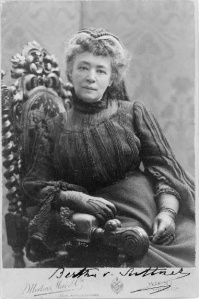
Bertha von Suttner (born Kinsky) answers a want-ad in the Viennese newspaper Die Presse from Alfred Nobel [1833-1896] in 1876 to become secretary-housekeeper at his Paris residence. She remains in Paris less than two weeks before returning to Vienna and secretly marrying Arthur von Suttner. Though her personal contact with Alfred Nobel had been brief, she corresponded with him until his death in 1896, and it is believed that she was a major influence in his decision to include a peace prize among those prizes provided in his will. December 10, 1905 von Suttner is named to receive the fifth Nobel Peace Prize (thus becoming the first woman peace laureate).
Emanuel stands his ground, replying that he would not expose his family to future reproaches “for having appropriated funds which rightfully belonged to deserving scientists.”
Sohlman not only has to deal with the relatives and the Swedish institutions, but also with Nobel’s complicated finances and international business affairs. In the midst of all this, he is suddenly called up to do his military service. Since estate matters cannot be postponed, Sohlman is permitted to install himself and his accountant in a private building inside the army camp, where they attend to correspondence in the evening after the day’s drilling is done. A corporal bicycles every day with their letters to the nearest post office. Since telephones are few and far between, Sohlman pays to have one set up in his own quarters, which he keeps busy. When Recruit Sohlman finishes his service and departs, the army probably sighs with relief.
In the probate court attorney Lindhagen answers claims that the will is unfair to the relatives by producing evidence that Nobel believed large inheritances removed heirs from the incentive to work and that in his final will he reduced bequests to his relatives because they were prospering.
What about the fact that the will lacks specifications for implementation? Here Lindhagen shows conclusively that this was always the way Nobel worked, delegating full responsibility to those in whom he had confidence.
It is fortunate that Nobel was not too explicit. The two witnesses to the will testify that his intention was not to reward achievement, but to give recipients fuller opportunities for fruitful development. They report Nobel’s remarks that a prize should not be given to “a man of action, as he would be tempted to give up work. On the other hand, I would like to help dreamers, as they find it difficult to get on in life.”
Had Nobel written dreamers into the will, the institutions chosen to make the awards would surely have rejected the assignment altogether. Now they are free to formulate their own policies and methods of selection, and many of their awards will go to seniors for past achievements.
The very fact that Nobel’s testament is so loosely drawn makes it possible for Sohlman and Lindhagen to arrive at a final settlement with all the parties. On 29 June 1900, King Oscar himself approves the statutes of the Nobel Foundation, created to provide the missing legatee and to receive the designated assets from the executors. Now proud of Nobel’s prizes, at the first award ceremony in 1901 the king begins the tradition of handing out the prizes which has been continued by his royal successors. Sohlman, looking back after a half century in which he himself had a distinguished career, including ten years serving as managing director of the Nobel Foundation, concluded his story of the long struggle over the will with an understatement, “In the light of later experience, the final outcome must be deemed satisfactory.” Without the skill and dedication of the personal assistant Nobel hired unseen from across the Atlantic, there would have been no such happy ending. Where there was a will, legally defective as it was and “nonsensical” as it might have seemed, Ragnar Sohlman found the way.
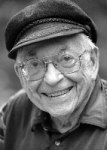 By Irwin Abrams
By Irwin AbramsOriginal title: The Struggle Over Alfred Nobel’s Testament
Irwin Abrams (1914-2010) was Distinguished University Professor Emeritus at Antioch University. He was regarded as one of the world’s leading authorities on the Nobel Peace Prize and the history of the international peace movement.
How 3 Orlov trotter stallions decided the faith of the Nobel Prizes
Most of the assets proved to be linked to Nobel’s holdings in the Russian oil company Baku Petroleum and a hundred or so ammunition and dynamite factories in Europe, North and South America, Australia and South Africa. Nobel also had substantial shareholdings in various mining companies, including gold mines, as well as revenues from his 355 international patents. In addition he owned a yacht – the first in the world with an aluminium keel – a stud farm for riding horses, and three valuable properties: the villa Mio Nido in San Remo, an apartment in Paris, and the villa Björkborn in Karlskoga (where he never took up residence).
A particular problem was that the bulk of Nobel’s securities and cash reserves were deposited in French banks in Paris, which might make it difficult for the estate to gain control of the assets without becoming subject to French inheritance tax.
To counter the Paris court’s finding of domicile, the executors – once all the securities and documents had arrived in Sweden – got the Karlskoga District Court to declare Björkborn to have been Nobel’s domicile. But this was just a stalemate for the time being with two courts each claiming the right to probate the will. But a stalemate was not enough. They needed Paris to give up its claim to having any jurisdiction over the probate.
The French authorities attempted at a certain point to get the money back since they considered Alfred’s home to be in Paris. A French lawyer, working for Sohlman, solved this problem: He found a paragraph in the French law that stated ‘’a man’s home is where he has his horses’’…
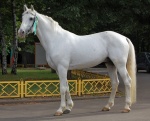
Nobel had 3 Orlov trotter stallions living in his villa Björkborn in Karlskoga. Reason for the French government to accept his domicile was not in France but in Sweden.
The critical victory came when Paris courts actually accepted that Alfred Nobel lived where his horses did – even though he did not- as Nobel kept 3 Orlov trotter stallions at his villa Björkborn in Karlskoga, Sweden.
It was now that Karlskoga and Björkborn Manor were to play an important role in Nobel’s Will. Much importance was placed upon the question of where Alfred Nobel had legally had his home. At the time of his death, he still owned his grand apartment in Paris plus a huge house in San Remo, Italy. Which property could actually be called his home? In the end, the courts decided that his legal home was in Karlskoga. Traditionally, it is said that this ruling was based upon the fact that Alfred’s three much-loved Russian Orlov horses were stabled in Karlskoga. In French law, a person’s home was where his or her horses were stabled. As a direct result of this ruling in the French courts, the execution of Alfred’s Will became subject to Swedish law. Had Alfred’s Will been subject to French law it is doubtful it would have met the strict, formal requirements necessary for it to be executed under France’s legal system.
It was now that Karlskoga and Björkborn Manor were to play an important role in Nobel’s Will. Much importance was placed upon the question of where Alfred Nobel had legally had his home. At the time of his death, he still owned his grand apartment in Paris plus a huge house in San Remo, Italy. Which property could actually be called his home? In the end, the courts decided that his legal home was in Karlskoga. Traditionally, it is said that this ruling was based upon the fact that Alfred’s three much-loved Russian Orlov horses were stabled in Karlskoga. In French law, a person’s home was where his or her horses were stabled. As a direct result of this ruling in the French courts, the execution of Alfred’s Will became subject to Swedish law. Had Alfred’s Will been subject to French law it is doubtful it would have met the strict, formal requirements necessary for it to be executed under France’s legal system.
Whether Sohlman’s moving of the securities to Sweden was tax evasion was probably moot once the French courts dropped their claim that Nobel was domiciled in Paris. But if the Russian horses had not come to Björkborn there would probably be no Nobel prizes today.
Source: The k2p blog
